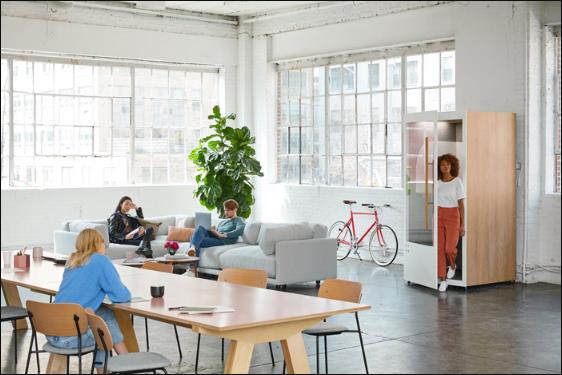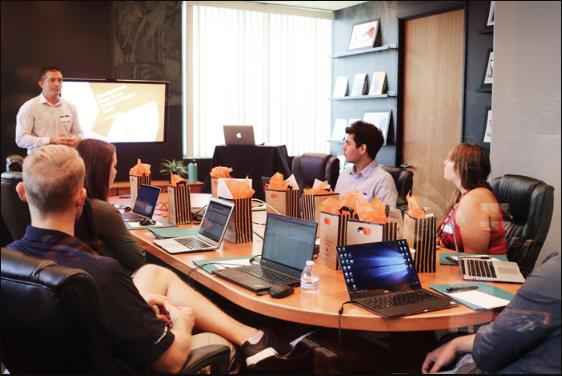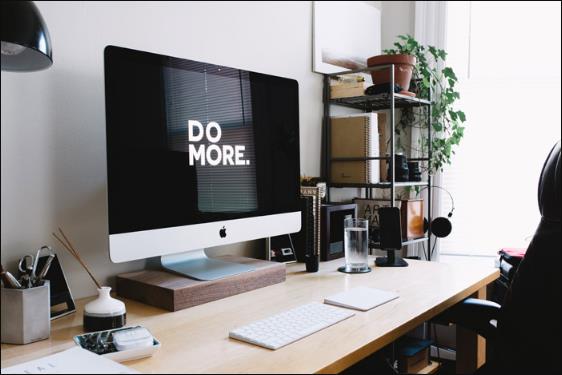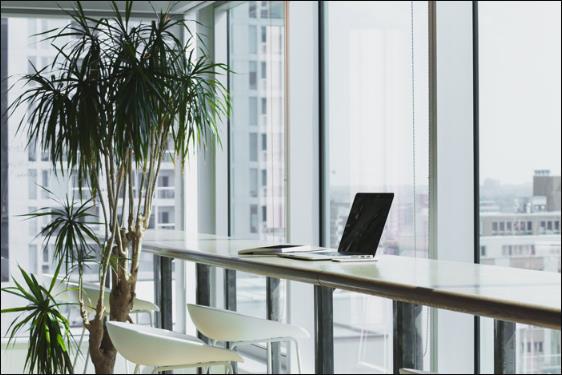你还在隔间里办公吗?人家的办公室早就大变样了!随着越来越多公司开启弹性工作时间和远程办公模式,办公室的功能和职员的需求也在悄然发生变化,办公环境自然也要随之改变。
1. Designated desks are no longer the norm
员工不再有固定的办公桌

The days of cubicles and assigned desk stations are finally coming to an end. As more office employees start working from home full-time or only come into work on certain days of the week, it no longer makes sense for employers to keep individual, assigned desks around for everyone.
隔间和固定办公桌的时代终于结束了。如今越来越多的员工全天在家工作,一周只有几天去上班,给每个人保留固定的单人办公桌不再有意义。
Instead, the office infrastructure is transforming to include more collaborative workspaces and unassigned seating in order to better serve employees who float in and out of the office. In this way, employees can find the spot that best suits them on a given day, while employers can save money on space and resources. It’s also becoming more common to see multiple clusters of desks or tables for different teams in order to promote unity and collaboration amongst them.
办公室的基础设施转变为更有利于合作的工作空间,不再对座位进行分配,以便更好地服务于进出办公室的员工。这样,员工可以找到当天最适合自己的座位,而雇主可以节省在空间和资源上花费的资金。为不同团队组合出多个办公桌群的做法也变得更为普遍,目的是促进员工的团结合作。
cubicle['kjubɪkl]: n. 小隔间
2. Incorporating more breakout spaces and lounge areas
更多的休闲区和休息区

While some people tend to work more productively in a traditional desk-and-chair layout, others feel better when they’re working from a sofa or bean-bag chair. That’s why offices are creating a new mixture of furniture zones that offer both laid-back and traditional seating options. This could range from collaborative tables for those who want to work in a more relaxed manner and socialize with co-workers, to soundproofed spaces or office pods for those who prefer to work alone or in silence.
尽管有的人在传统桌椅布局中可以更高效地工作,其他一些人则感觉坐在沙发或豆袋椅上更舒服。这就是为什么新型办公室会将休闲家具和传统办公桌椅结合在一起。喜欢更放松的工作方式、需要和同事交流的人可以选择合作桌,而那些喜欢沉默地独自工作的人,可以选择隔音的办公室或办公间。
Workplaces are also starting to take advantage of wellness initiatives to attract and retain their employees. many offices now include “green” areas that bring the feeling of nature indoors, and wellness rooms where members can meditate, practice yoga, or engage in any activity that lets them take a break from sitting at their desks.
还有一些办公场所开始用健康计划作为福利来吸引和留住员工。许多办公室现在都有绿化区,可以在室内感受到大自然,还有养生房,会员可以在房间里冥想、做瑜伽,或在工作间隙做任何可以放松的活动。
laid-back['leidbæk]: adj. 懒散的;悠闲的;闲散的
3. Building smaller conference rooms
更小的会议室成为趋势

Traditional board rooms and conference rooms with tables big enough to host 20 people are another casualty of the remote workforce movement. Instead, smaller conference rooms that simply fit four to six people and a media center are quickly becoming the new norm for office meeting environments.
放有能够容纳20个人坐下的大桌子的传统董事会议室和会议室将成为远程办公运动的又一个牺牲品。只能容纳四到六个人和一个媒体中心的小会议室很快将成为办公会议环境的新常态。
In this new mobile climate, many employees are starting to come into the physical office solely for face-to-face meetings with co-workers or to bring in vendors and clients for presentations. This means that employees are specifically coming into the office for access to these meeting rooms, and offices should be sizing those spaces accordingly.
在移动办公的新风气下,许多员工来办公室只是为了和同事面对面交流,或者给供应商和客户做演示。这意味着员工是专程来用会议室的,办公场所也应该相应地分配这些空间的大小。
casualty['kæʒuəlti]: n. 伤亡人员
vendor['vɛndɚ]: n. 卖主;小贩;供应商
4. Technology that cuts the bind between office and home
技术模糊了办公室和家的界限

When offices have more employees working from home — or even from other countries — it’s critical to have the proper technology to connect people together easily.
如果办公室中更多的员工是在家办公,甚至是在其他国家远程办公,那么通过适当的技术轻松地将人们联系到一起就十分关键。
To do this, offices are using VoIP phones, which make phone calls through the internet rather than regular landlines, to help employees around the world appear as though they’re calling from the office.
为此许多办公场所开始使用网络电话而非常规的有线电话,帮助世界各地的员工进行电话沟通,就和在办公室内打电话一样方便。
VoIP phone: 蓝牙声麦;网路电话
landline['lændlaɪn]: n. (电话的)陆地线路,陆线, 固网
5. Smaller offices, smaller carbon footprint
更小的办公室,更少的碳足迹

There are huge bonuses, both financially and environmentally, to offices employing more remote workers. For employers, less people in the office equals less needed space—meaning they can save huge amounts of money by renting or building smaller office spaces, and by using less energy and water, lowering their utility bills.
公司雇佣更多远程工作的员工有极大的经济和环境红利。对于雇主来说,办公室里人更少意味着需要的空间更少,租用或建造的办公空间更小,使用的能源和水更少,物业账单降低了,意味着可以省下很多钱。
For employees, the ability to work remotely means an erased commute, which in turn will reduce air pollution and help create a smaller carbon footprint.
对于员工来说,可以远程工作意味着不必通勤,从而能减少空气污染和碳足迹。
utility bill: 帐单;物业帐单;费用单







